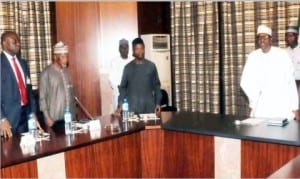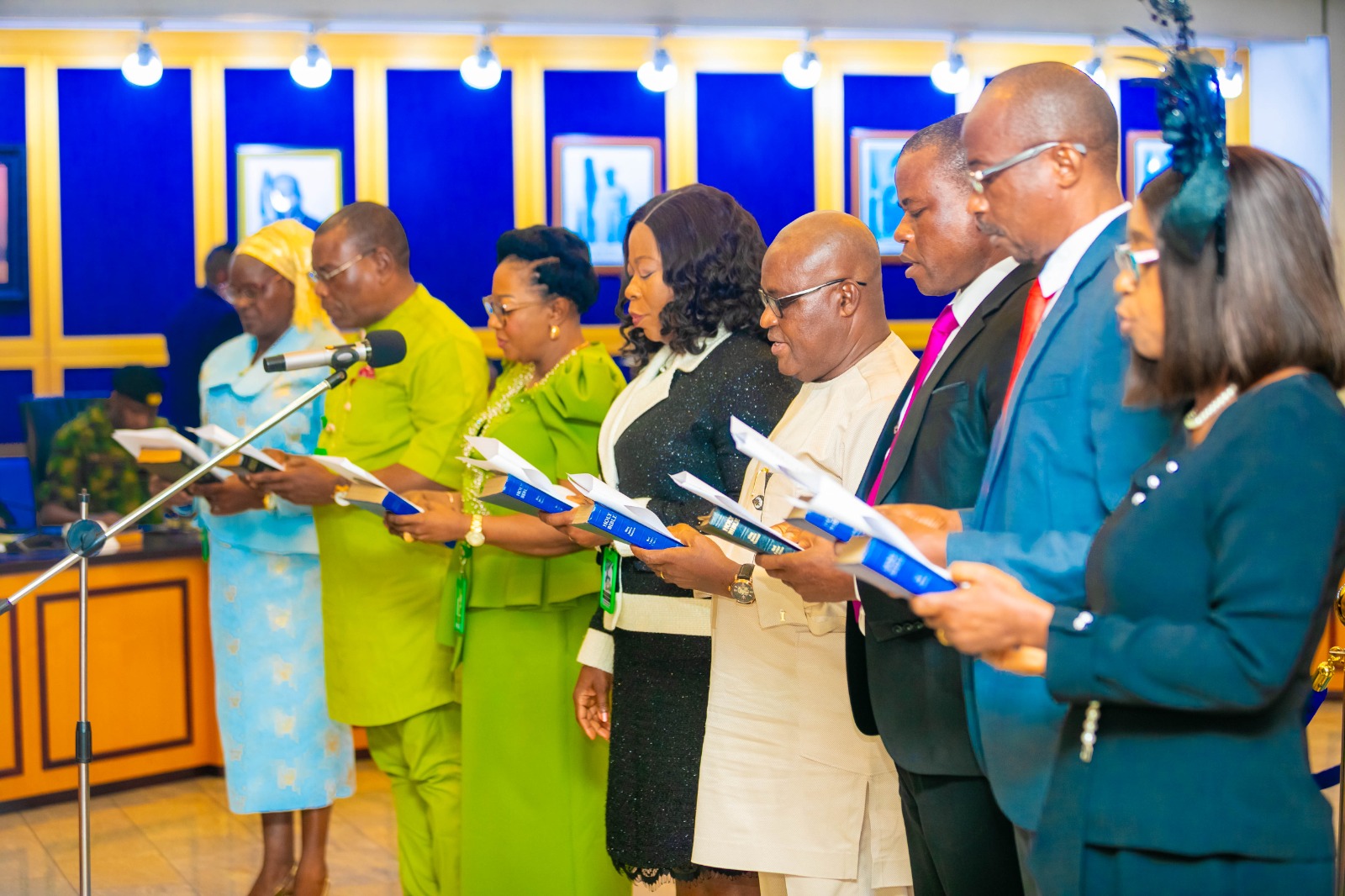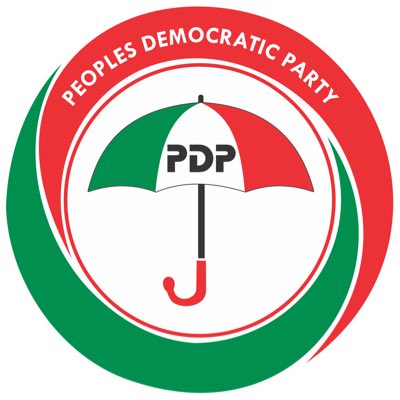News
Reps Unfold Agenda For Nigerians …To Cut Cost Of Governance

L-R:Permanent Secretary, State House, Mr Nebolisa Emordi; former Military Administrator of Kaduna State, Retired Col. Hamid Ali, Vice-President Yemi Osinbajo and President Muhammadu Buhari, during a meeting at the Presidential Villa in Abuja, Monday
Speaker of the House of Representatives, Rt Hon Yakubu Dogara yesterday said it would implement a legislative agenda aimed at improving the living conditions of Nigerians.
Dogara said this in his presentation of a draft of the legislative agenda of the 8th House of Representatives in Abuja.
The Speaker said the agenda outlined steps and prioritised legislative actions required to achieve set goals and objectives.
According to him, the legislative agenda takes lessons from the experiences of the 7th House of Representatives and seeks to consolidate the gains and achievements thereof.
“The House recognizes that there remains widespread citizens’ distrust of public institutions and government generally.
“It is also recognized that there is a lot of public misconceptions and misperceptions about the functions and contributions of the legislature to Nigeria’s overall socioeconomic and political development.
“Yet, the legislature’s contributions to Nigeria’s democracy remain critical and important.
“The 8th House of Representatives will assert its role in providing leadership in the areas of accountable and transparent government, citizens engagement, as well as constituency representation’’, he said.
Dogara added that the 8th House of Representatives would collaborate with the Senate and other arms of government to legislate for the common good of the Nigerian people.
“Our legislative activities will cover critical spheres of life in Nigeria.
“The House will legislate to achieve reforms in economic development, tackle poverty and unemployment and confront the scourge of corruption and terrorism/security challenge.
“The House will also give priority to legislations to address environmental challenges such as desertification, erosion and pollution.
“The 8th House of Representatives will legislate to cut the cost of running government, reduce wastage and tackle revenue leakages’’, Dogara said.
The speaker stressed that the House would play its part in rescuing the country from hunger, poverty, disease, social, economic, political and infrastructural challenges.
He said “the 8th House of Representatives, as peoples’ parliament, will be sensitive to public demands for transparency and accountability.
“Our legislative actions would therefore seek to build public confidence and trust and be responsive to citizens’ questions regarding the conduct of legislative business.
“The House will work for public good and serve as the institution that defends the rights of the people to an accountable and transparent government.’
Meanwhile, some Civil Society Organisations (CSOs) yesterday in Abuja demanded a 60 per cent downward review in the salaries and allowances of National Assembly members.
Other stakeholders, have however, demanded a cut of as much as 90 per cent from the members salaries and allowances as well as the scrapping of allocation for constituency projects.
The CSOs, during a protest at the National Assembly’s gate, said that the demand was important in view of the number of Nigerians living in poverty and the country’s revenue.
The Executive Director, Conscience Nigeria, Mr. Tosin Adeyanju said the CSOs staged the protest because Nigerians were angry about the jumbo pay to lawmakers and appointees despite the country’s economic reality.
Adeyanju said Nigerian lawmakers were the highest paid in the world, adding that “we need this money to develop our infrastructure’’.
“In 2013, the National Assembly allocation and budget was about N50 billion; by 2015, it has astronautically jumped to about N120 billion for just 469 people. Is it justifiable?
“For a country that has over 180 million people, and in a nation that is in economic crises with huge dependence on oil revenue that has dipped by 50 per cent, we need to save Nigeria from imminent collapse or is it that they want this country to turn to another Greece,’’ Adeyanju said.
He called on President Muhammadu Buhari to lead by example and to ensure that the number of political appointees was reduced and their wages cut by 60 per cent.
“Political position must be made less attractive so that political assassination can stop and cost of electioneering in the country can reduce,’’ Adeyanju said.
The CSOs listed “Details of remuneration of Nigerian senator’’ in a flier distributed by the protesters.
In the flier, the basic total monthly pay per senator is N29.47 million amounting to N353.76 million $2.18 million) per annum for each senator.
The breakdown of the payment pay put the Basic Salary (BS) at N2,482, 245.50; Hardship allowance (50 per cent of BS) amounts to N1,242,122; Constituency allowance (at 200 per cent of the BS) amounts to N4,968,509 and Newspapers allowance (at 50 per cent of BS) amounts to N1,242,122.70.
The monthly salary also includes; Wardrobe allowance (25 per cent of the BS) which amounts to N521,061.37; Recess allowance (10 per cent of the BS) which amounts to (N248,424.55) and Accommodation allowance (200 per cent of the BS) amounting to N4,968,509.
Others are; Utility allowance of 828,081.83 (30 per cent of BS); Domestic allowance of N1.86 million (70 per cent of BS) and Entertainment allowance of N828,082 (30 per cent of BS).
Others are; Vehicle maintenance allowance of N248,426, (75 per cent of BS); Severance Gratuity allowance of N7.5 million (300 per cent of BS) and Car allowance of N9.9 million (400 per cent of BS).
Adeyanju said the figures were obtained from a research conducted by the organizations, adding that if the lawmakers NASS disagreed, they should come out with their facts.
Also speaking with newsmen, Dr Pregrino Briamah, a co-convener of the protest, Dr. Pregrino Briamah called for 90 per cent downward review of the lawmakers’ salaries and allowances as well as an immediate termination of constituency project allowance.
Briamah said that the CSOs would not wait for the downward review by the Revenue Mobilisation Allocation and Fiscal Commission (RMAFC), who he said, lacked the credibility to do it.
He said a copy of their letters was already sent to President Buhari.
“We demand that the presidency should commence an immediate termination and investigation of the Directors of RMAFC or a total and radical overhaul of the agency.
“We also demand that there should be 100 per cent transparency and oversight.
News
Ibas Inaugurates RSIEC, Service Commissions, Healthcare Board In Rivers …Charges Appointees To Embrace Principles Of Service

The Administrator of Rivers State, Vice Admiral (Rtd) Ibok-Ete Ibas, has charged newly appointed Board members to uphold the highest standards of discipline, competence, integrity, and unwavering dedication in their service to the State.
He emphasized that such commitment is critical to stabilizing governance, restoring democratic institutions, and advancing the principles of good governance in the State.
This was contained in a statement by the Administrator’s Senior Special Adviser on Media, Hector Igbikiowubo on Monday.
Ibas issued the charge on Monday while inaugurating the reconstituted Rivers State Independent Electoral Commission (RSIEC), Rivers State Civil Service Commission, Rivers State Local Government Service Commission, and the Rivers State Primary Health Care Management Board at Government House, Port Harcourt.
The Administrator urged the new appointees to embrace their roles with diligence, patriotism, and a commitment to transforming Rivers State through excellent service.
Addressing the Chairman and members of RSIEC, Ibas underscored their pivotal role in ensuring credible local government elections that reflect the will of the people.
“Your task is clear but demanding: to conduct free, fair, transparent, and credible elections at the grassroots level. You must resist bias, favoritism, and external interference while restoring public confidence in the electoral process,” he stated.
“The independence of your actions is crucial to sustaining peace, stability, and grassroots governance. I urge you to act with fairness, impartiality, and professionalism—even in the face of difficult choices,” Ibas added.
The Sole Administrator also charged the Rivers State Civil Service Commission on the need to eliminate mediocrity and foster a culture of excellence through merit-based recruitment, training, and promotions.
“The civil service must transition from favoritism to competence, integrity, and accountability. Your commission will lead reforms, including digital transformation and standardized practices across ministries, departments, and agencies,” he said.
He disclosed that extensive training programmes are underway, with a committee set up to overhaul the public service framework for greater efficiency.
Meanwhile, Ibas urged the Rivers State Local Government Service Commission to ensure professionalism and discipline in local government administration.
“As the closest tier of government to the people, you must drive reforms that insulate the system from politics and mediocrity. Your mandate includes merit-based recruitment, training, and enforcing standards for effective service delivery,” he stated.
In the same vein, the Administrator charged the Rivers State Primary Health Care Management Board with revitalizing healthcare delivery across the state’s 23 local government areas.
“Primary healthcare is the foundation of a sustainable health system. Your board must ensure facilities are adequately staffed, equipped, and operational focusing on maternal health, immunization, malaria control, and community health services,” he said.
He emphasized data-driven operations, incentives for rural health workers, and restoring the referral system to improve healthcare access.
He also assured the Board of sustained government support, including funding, for the effective discharge of their mandates but warned that board members would be held accountable for their performance.
The newly inaugurated members include: RSIEC: Dr. Michael Ekpai Odey (Chairman) with Prof. Arthur Nwafor, Prof. Joyce Akaninwor, and others as members.
Civil Service Commission: Dr. Livinus Bariki (Chairman), Amb. Lot Egopija, Mrs. Maeve Bestman, and others.
Local Govt. Service Commission: Mr. Isreal Amadi (Chairman), Rear Adm. Emmanuel Ofik (Rtd), Dr. Tonye Pepple, and others.
Primary Health Care Board: Dr. Dawari George (Chairman), Dr. Chituru Adiele (Executive Director), Prof. Kaladada Korubo, and representatives from key ministries.
News
Rivers PDP Debunks Sale Of LGA Election Forms

The Publicity Secretary of the Peoples Democratic Party (PDP) in Rivers State, Dr. Kenneth Yowika, has debunked claims that the party has commenced sale of forms for chairmanship and councillorship elections across the 23 local government areas of the state.
Yowika made the rebuttal in a statement made available to newsmen on Wednesday, describing the publication on the social media as baseless and untrue.
He urged members of the PDP to disregard the claim, saying that official communication regarding the sale of forms would be disclosed through the appropriate channels.
“With reference to information trending on social media, it has been falsely claimed that the sale of forms for Chairmanship and Councillorship elections in the 23 Local Government Areas (LGAs) of Rivers State will begin soon.
“However, the party has firmly denied these rumours, stating that they are baseless and untrue.
“The party has its own established methods of reaching out to its numerous supporters.
“The People’s Democratic Party, a law-abiding organisation, will patiently await the release of guidelines from the recently inaugurated Rivers State Independent Electoral Commission (RSIEC) before considering any sale of election forms.
“The PDP is urging its members to remain calm as official communication regarding the sale of forms will be disclosed through appropriate channels,” the statement read.
Enoch Epelle
News
South-South contributes N34trn to Nigeria’s economy in 2024 – Institute
Prof. Pius Olanrewaju, President of the Chartered Institute of Bankers of Nigeria (CIBN), has stated that the South-South region contributes N34 trillion to country’s economy in 2024.
He made the remark at the South-South Zonal Banking and Finance Conference in Calabar, yesterday.
He spoke on the theme, ‘’Building An Inclusive South-South: Economic Diversification as a Catalyst For Development.’’
Olanrewaju, who quoted the data from the Cable Data Index, said the feat was more than 21 per cent of Nigeria’s real Gross Domestic Product (GDP).
The president described the growth as ‘’ impressive,’’ saying that it was not driven by oil alone but significant expansions in trade, services, and the creative industries.
According to him, to fully harness this potential, coordinated financial, technological, and policy support is essential.
“As we work to reposition the South-South for broad-based prosperity, the financial system must play a central role, not merely as a source of capital, but as a catalyst for innovation, ideas incubation, and inclusive economic growth.
“This conference, therefore, provides a strategic opportunity for stakeholders to reimagine the South-South economy, not merely as a resource belt, but as a region of diverse capabilities and resilient enterprises.”
Olanrewaju added that Nigeria must move beyond old models and chart a new course for the development of the South-South region, where financial institutions and stakeholder collaborate to diversify the economy for shared prosperity.
He, however, commended Gov. Bassey Otu for his pledge of land for CIBN Secretariat in Cross River and being the first sitting governor to willingly undergo and complete the Chartered Bankers Programme.
On his part, Gov. Otu said that the conference discussion on the economic diversification in South-South region was timely against the backdrop of global trade and economic volatility that was affecting the nation’s economy.
Represented by his deputy, Mr Peter Odey, Otu said the South-South region must now act with urgency to diversify its economy while leveraging its shared natural endowment in agriculture and extractive resources.
“This conference must help develop tailored financial solutions that reflect the unique strengths and realities of states like Cross River in the south-south.
“Diversification should be evidence-based and must be backed not just by financial advice but project focused financing and real investment support,” he noted.
He said that Cross River had taken the bold step to invest in its agricultural sector by launching an Agro processing hub.
Otu further said that the state had invested in aviation by acquiring more aircrafts for Cally Air, construction of the Bakassi Deep Seaport and injecting N18 billion in its tourism sector.
Similarly, Mr Tolefe Jibunoh, Cross River Branch Controller of the Central Bank of Nigeria (CBN) said that the region was blessed with natural resources, cultural diversities and immense human potentials.
Jibunoh, who was represented by Mr Segun Shittu, Head, Currency Control Office, CBN, Calabar, noted that strategic diversification could unlock unprecedented opportunities for growth in the region.
He added that the CBN remained steadfast to maintain monetary possibilities and promote a sound financial system as a catalyst for sustainable economic development for the benefit of all.
-
Business5 days ago
NCDMB Promises Oil Industry Synergy With Safety Boots Firm
-
Rivers5 days ago
Motor Spare Parts, Industrial Generators Dealers’ Union Swears Gets New Chairman in Port Harcourt
-
News5 days ago
South-South Contributes N34trn To Nigeria’s Economy In 2024 – Institute
-

 Women5 days ago
Women5 days agoWhat To Know About Fufu, Loi Loi
-
Rivers5 days ago
ASALGA Community Debunks Reports On Ownership Of Land Its Settlements
-
Opinion5 days ago
Why Reduce Cut-Off Mark for C.O.E ?
-
City Crime5 days ago
RSG Tasks Federal Government On Maternal Deaths
-
News5 days ago
NOA Set To Unveil National Values Charter — D-G

